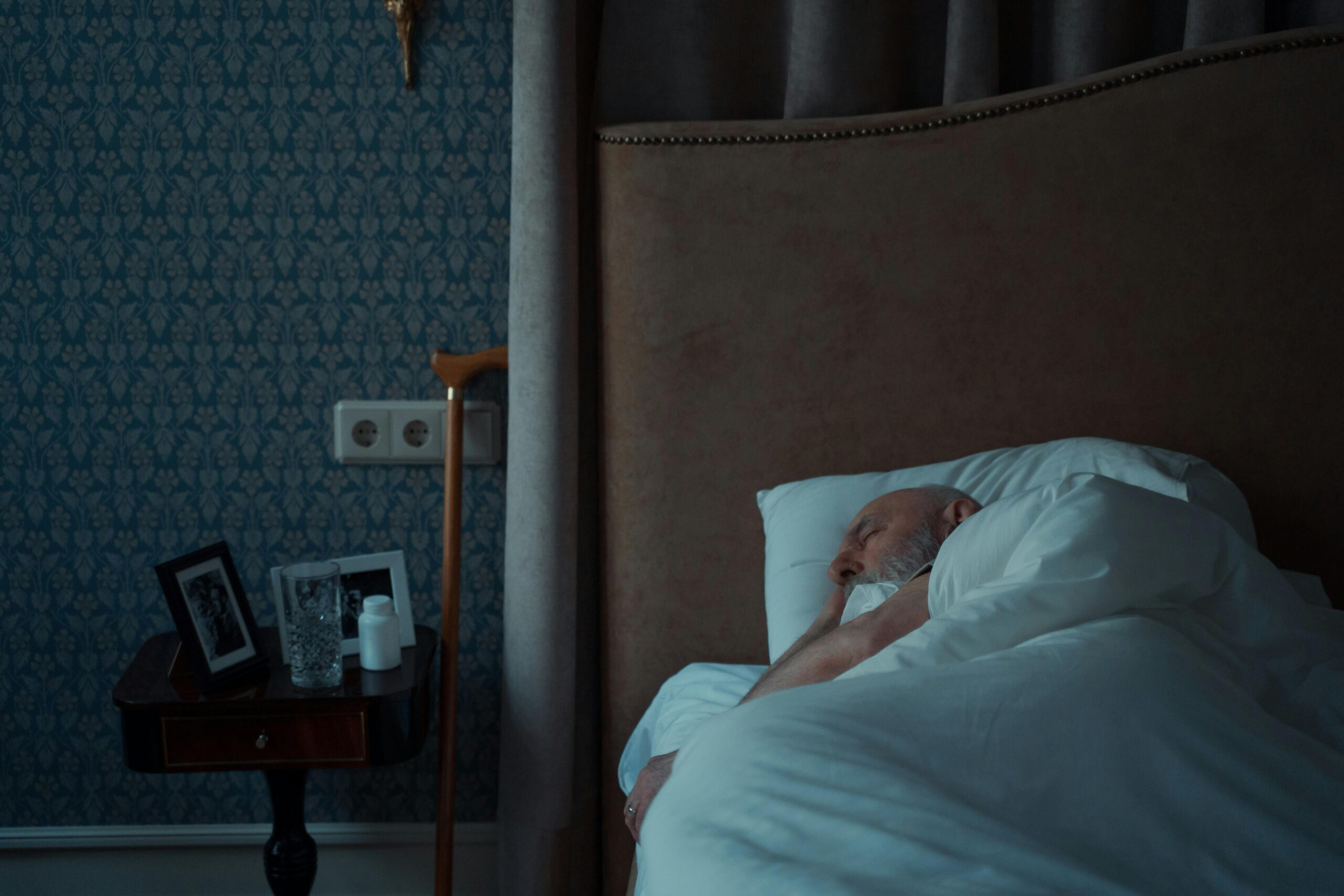As we get older, our sleep patterns change a lot. Seniors with chronic health issues find it hard to sleep well. This guide helps them tackle sleep problems and find ways to sleep better.
Key Takeaways
- Seniors with chronic health conditions often experience age-related sleep changes and the impact of their medical issues on sleep quality.
- Creating an optimal sleep environment, managing medications, and incorporating natural sleep aids can significantly improve sleep for elderly individuals with chronic conditions.
- Collaboration with healthcare providers is crucial in addressing sleep problems and finding personalized solutions.
- Prioritizing good sleep hygiene and adopting relaxation techniques can help seniors with chronic illnesses achieve better, more restorative sleep.
- Improving sleep quality can positively impact overall health, well-being, and quality of life for seniors with chronic conditions.
Understanding Sleep Challenges in Older Adults
As we get older, our sleep changes a lot. Seniors face unique sleep challenges. It’s key to tackle these to keep them well and happy.
Common Age-Related Sleep Changes
Older adults often sleep earlier and wake up sooner, and they might also wake up more during the night. This makes their sleep lighter and less restful.
Impact of Health Conditions on Sleep Quality
Conditions like arthritis, Parkinson’s disease, and heart disease affect sleep. Pain, discomfort, and medication side effects can disrupt sleep.
Signs of Poor Sleep in Seniors
It’s important to spot signs of poor sleep in seniors. Look out for:
- Excessive daytime sleepiness or fatigue
- Difficulty falling asleep or staying asleep
- Frequent waking during the night
- Restless or non-restorative sleep
- Increased irritability or mood changes
Knowing these challenges helps us find ways to improve sleep for seniors. It’s about managing sleep disorders in aging adults and keeping sleep hygiene for elderly people in check.
How to Improve Sleep for Seniors with Chronic Conditions
Many seniors struggle to get a good night’s sleep, especially with chronic health issues. But there are ways to improve sleep quality. Let’s look at some tips for comfortable sleep positions, sleep aids for the elderly, and bedtime routines for better sleep.
Optimal Sleep Positions for Seniors
Choosing the proper sleep position is key for seniors with chronic conditions. Side sleeping can ease back and hip pressure. Elevating the upper body can also help with acid reflux and breathing. Choosing different comfortable sleep positions for seniors can help find the best one.
Incorporating Sleep Aids for the Elderly
For some, sleep aids for the elderly are needed for a good night’s sleep. Over-the-counter sleep aids like melatonin or valerian root can help. Doctors might also prescribe medications for sleep issues. Always talk to a doctor before trying new sleep aids for the elderly.
Establishing Beneficial Bedtime Routines
Having a consistent bedtime routine is very helpful for better sleep. This can include light stretching, reading, or relaxation techniques like deep breathing or meditation. It’s best to avoid stimulating activities before bed, like TV or electronics.
By using these strategies, seniors with chronic conditions can get better sleep. This can significantly improve their health and well-being.
Creating an Optimal Sleep Environment for Elderly Care
Creating a cozy and sleep-friendly space is key for seniors with sleep problems. To create a perfect sleep spot, focus on bedroom temperature, lighting, bedding, and noise control.
Bedroom Temperature and Lighting
Keeping the bedroom at the right temperature is vital for good sleep. It should be between 65°F and 70°F (18°C and 21°C). A cooler room helps the body relax and start the sleep cycle.
Also, soft, dim lights in the evening tell the brain to make melatonin, a hormone that helps us sleep.
Selecting the Right Mattress and Pillows
Choosing the right mattress and pillows is important for comfort. Look for mattresses that support the spine and ease pressure, especially for those with pain or mobility issues. Soft, supportive pillows can also help with neck and shoulder pain, leading to better sleep.
Noise Control and Sound Management
Reduce outside noise for a peaceful sleep. Use noise-canceling curtains, white noise machines, or earplugs to block out sounds. Also, seniors should be told to avoid TV and electronic devices before bed. The blue light can mess with their sleep cycle.
By improving the sleep environment, caregivers can help seniors sleep better. This leads to better health and well-being.
Managing Medications and Their Impact on Sleep
Seniors with chronic health conditions often struggle with their medications and sleep. Understanding how medication timing and side effects affect sleep is important. Working closely with healthcare providers is key to better sleep and well-being.
Timing of Medication
When you take your medications can really impact your sleep. Some meds are best in the morning, while others work better at night. Talking to your healthcare provider can help you find the best time to take your meds to avoid sleep problems.
Side Effects and Sleep Interference
Many medications, especially those for chronic illness sleep problems, can mess with your sleep. They might make you drowsy, stay awake, or change your sleep patterns. It’s vital to talk to your healthcare provider about these side effects. They can help find other sleep aids for the elderly that work better.
Working with Healthcare Providers
Working with your healthcare team is essential for managing medication’s impact on sleep. They can offer personalized advice on adjusting your meds, suggest other treatments, and create a plan to improve your sleep. This plan will help manage your chronic conditions effectively.
“Addressing the complex interplay between medications and sleep is a critical aspect of improving overall health and well-being for seniors with chronic illnesses.”
Natural Sleep Aids and Relaxation Techniques
Seniors With Sleep Problems: The Benefits Of Natural Remedies And Relaxation Methods Herbal supplements such as chamomile, valerian, and melatonin can ease the mind and body and help you feel sleepy.
Gentle mindfulness practices, like deep breathing and gentle yoga, also help there. They can help relieve stress and anxiety, allowing your body to relax and sleep well.
One of the major keys to better sleep is having a regular bedtime routine. Things such as a pleasant bath, studying, or gentle music indicate sleep time. These habits are related to better sleep quality and duration.
Some light activity during the day, whether taking a walk or stretching, also works. It is to keep the clock in your body synced
However, everyone should contact healthcare providers before making big changes to their regimen to ensure they use the most safe and helpful natural sleep aids. Seniors Can Sleep Better Through These Methods, which enhances their well-being and joy.
FAQ
What are the common age-related sleep changes that seniors experience?
All of these become even more difficult when middle-aged men do not get enough sleep, which is an inevitable process for us. You may get poorer sleep, wake more often, or sleep more lightly. Health problems can also aggravate the changes.
How do chronic health conditions impact sleep quality in seniors?
So can chronic illnesses such as arthritis and heart disease. Difficulty sleeping can stem from pain, dyspnea, and side effects from medications.
What are some signs of poor sleep in older adults?
This may appear as excessive daytime sleepiness, difficulty concentrating, a mood disorder, and an increased risk for falls in older adults. It will also significantly affect health and joy.
What are some effective strategies for improving sleep in seniors with chronic conditions?
Seniors can follow a regular bedtime, make their bedrooms more comfy, and use natural sleep aids to help them sleep. They should also talk with their doctors about their medications and sleep issues.
How can seniors create an optimal sleep environment?
Seniors can optimize their bedrooms by turning the temperature and light up or down. They also need to choose the correct mattress and pads. Since sleep areas need to be quiet, noise control may help them sleep peacefully.
How do medications affect sleep in older adults, and how can seniors manage this?
Many prescription drugs for older adults mess with sleep either because of when they are taken or because of the drug’s side effects. People with chronic illnesses must partner with doctors to adjust meds and sort out sleep problems.
What natural sleep aids and relaxation techniques can seniors use to improve their sleep?
Herbal aids, calmness exercises, or similar may be a starting point for senior citizens. These make relaxing and sleeping easier without the need for medication.










